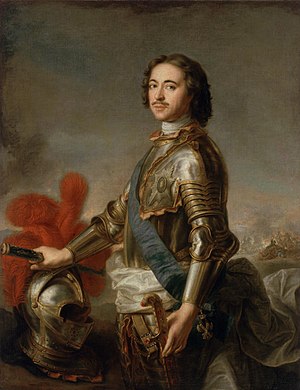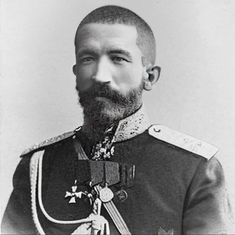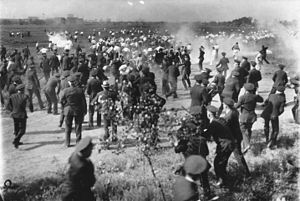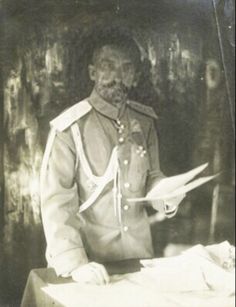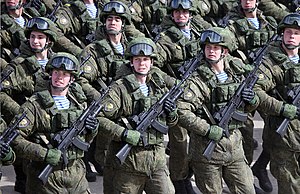Slavic Union: Difference between revisions
No edit summary |
|||
| Line 167: | Line 167: | ||
Nikifor Osipov would pass away from a heart attack on April 18 1953, having turned 63 18 days earlier. This event triggered a national week of mourning, he would receive a state funeral with military honors on April 22 1953, with thousands of Slavs attending, over the next 30 years the Slavic Union would continue to industrialize, eventually catching up technologically with the rest of the world. | Nikifor Osipov would pass away from a heart attack on April 18 1953, having turned 63 18 days earlier. This event triggered a national week of mourning, he would receive a state funeral with military honors on April 22 1953, with thousands of Slavs attending, over the next 30 years the Slavic Union would continue to industrialize, eventually catching up technologically with the rest of the world. | ||
=== [[1971 Economic Crash]] === | === [[1971 Slavic Economic Crash]] === | ||
In 1971, under the leadership of Kolzak Nikolaev the Slavic Union suffered through the worst economic crisis since the 1920s, with unemployment and inflation skyrocketing. In 1972 General [[Vasili Osipov]], son of Nikifor Osipov, would have Nikolaev arrested for treason, the government would crack down on monopolies and temporarily would take much greater control of the economy. Eventually in 1976 the economy would return to normal levels. | In 1971, under the leadership of Kolzak Nikolaev the Slavic Union suffered through the worst economic crisis since the 1920s, with unemployment and inflation skyrocketing. In 1972 General [[Vasili Osipov]], son of Nikifor Osipov, would have Nikolaev arrested for treason, the government would crack down on monopolies and temporarily would take much greater control of the economy. Eventually in 1976 the economy would return to normal levels. | ||
Revision as of 19:14, 28 March 2021
Slavic Union Славянский союз
Slavyanskiy Soyuz | |
|---|---|
| Motto: "Vozhd' nad Soyuzom, Soyuz prezhde vsego!" (Russian) "The Vozhd above the Union, and the Union above all!" | |
| Anthem: "[Privetstvuyu Vozhd'] (Russian)" Hail to the Vozhd | |
| Capital | Osipovgrad |
| Official languages | |
| Ethnic groups | |
| Religion | Orthodox Christianity |
| Demonym(s) | Slavic |
| Government | Unitary One Party Dictatorship |
• Vozhd | Maksim Borosov |
| Anton Vinogradov | |
| Matvei Pavlov | |
| Georgii Federoff | |
| Legislature | Duma |
| Establishment | |
| March 12 1813 | |
| October 18 1938 | |
| GDP (PPP) | 2020 estimate |
• Total | 333 billion |
| Currency | Ruble |
| Driving side | Right |
| Calling code | +327 |
The Slavic Union (Slavic: Славянский союз, Slavyanskiy Soyuz) also commonly known as simply The Union is a nation located on the continent of Euronia in the Coalition of Crown Albatross, bordered by Gladysynthia and Paraboca. [Other facts about location]
The nation's capital is located in Osipovgrad, with other major cities in Ivanovgorod, Moscow and Zhukovgrad. The nations west is heavily populated, with the majority of the east's population living in small towns.
For centuries the Slavic Union was a series of small, constantly warring princedoms, until they were united into the Slavic Empire by Tsar Ivan I in the 18th century. Eventually in 1917 the Krasnyy attempted to overthrow the monarchy, starting the 12 year Slavic Civil War, which would eventually be won by the white army, and the Slavic Republic would be established. Eventually in 1938 the tsardom would be abolished by Nikifor Osipov, who would take complete control of the nation and establish the Slavic Union with himself as Vozhd.
While technically a democracy due to the Duma the Vozhd is a dictator with almost complete control over the Union, with the nation also being a one party state.
The Slavic Union has often been criticized for its blatant human rights abuses, suppressing any criticism of its regime, and how much power the military has over it, essentially acting as another branch of the government.
History
Early History
The first settler of the modern day Slavic Union were the Rodnyye, who came here during Second Great Iearth Migration dated to approximately 50,000 years BP. The first settlers came form Zamastan and were primarily hunter gatherers. The mountains near the middle of the country meant that settlement of the east was sparse.
Early on the land that now makes up the Slavic Union was divided among small princedoms in a near constant state of warfare, over time as technology advanced Slavs were able to connect more with outside nations, the constant warring lead to many young boys being trained from birth to be a soldier, gaining Slavs a reputation for being good fighters, with many being hired as mercenaries.
The constant warfare kept the Slavic nations behind technologically and culturally, with the average lifespan being incredibly short and the Industrial Revolution passing them by. In 1802 Ivan I was crowned king of Moskva, and by 1813 he had brought all Slavic lands under his control, he was crowned Tsar of the Slavs by the Patriarch of the Orthodox church.
Slavic Empire
Despite the unification of Slavic lands the Empire remained behind other nations in the world, with old practices such as leaving newborns perceived as weak out to die being maintained for centuries before slowly dying out in the late 1800s. Slavery was abolished in 1822 but serfdom remained until 1877.
Slavic tsars often preferred to party and display their wealth as much as they could, mingling with the rulers of foreign nations more than their own people. The Slavic Empire's backward state often had them perceived as the odd man out among other nations, despite this a strong nationalist sentiment formed among the people.
Over time the lower classes polarized into wildly different ideologies, when Pyotr Laskin wrote his book A Critique of Capitalist Economics better known as Capital, it was wildly popular, but things weren't universal, with several right wing thinkers publishing their own writings and right wing nationalists rising up in reaction to the communist movement.
In 1909 the Slavic Social Democratic Party, better known as the Krasnyy (Slavic for red after the red arm bands they wore at rallies) was formed, and quickly became the dominant socialist party in the Empire under the leadership of Arseni Bolotin.
Slavic Civil War
Main Article: Slavic Civil War
On September 12 1917 Russian police opened fire on peacefully protesting Krasnyy members, starting a riot which lead to the deaths of 9 Krasnyy and 2 police officers, with several more injuries. After this Tsar Aleksei II declared the Krasnyy a terrorist group, which lead to hundreds of Krasnyy taking up arms and storming the capital building in the Battle of the Winter Palace, where Aleksei and his family were rounded up and executed via firing squad before being hung by lampposts in the city streets.
With the Krasnyy quickly taking control of the Slavic capital of Ivanovgorod (The name of which would soon be changed to Bolotingrad) and establishing the Slavic Socialist Republic (SSR) in the nations north, with a provisional Slavic State made up of a coalition of anti-communist forces being established in the south with the capital in Adrikagorod (Modern day Osipovgrad).
Aleksei II's uncle Aleksandr I managed to flee south to Adrikagorod, being installed as a constitutional monarch, his powers now kept in check by the Duma and the Prime Minister. Fighting was almost immediately fierce, Slavic tactics had evolved little beyond close quarters take no prisoners combat, which was effective at striking fear into your enemies, but not at limiting casualties.
One of the few exceptions to this rule was General Nikifor Osipov, who developed a military doctrine known as Sekretvoyna, which would use guerilla and deception tactics, the most prominent use of which was in the Ledyanaya Offensive. Osipov also formed the Slavic Union Party in 1918, a Slavic nationalist party, which soon would become much more.
While Osipov would win victory after victory in the east the rest of the slavic army struggled against the SSR, which controlled Bolotingrad, at the time the industrial and economic hub of the Slavic nation, one of the most destructive examples of incompetence was the Battle of Provropol, in which an underequipped force of 90,000 marched into the city of Provropol, the poorly commanded force would suffer 20,000 casualties, with thousands more captured.

By 1922 SSR forces were within sight of Adrikagorod, with Nikifor Osipov given the task of defending against the 300,000 man strong army with 180,000 men. The SSR was eventually able to capture the city after a nearly 2 year siege where they lost 170,00 men to the Slavic State's 30,000. Osipov was captured by the red army but the SSR was severely weakened to the point where they could never recover.
Osipov was imprisoned by the SSR, and in the time between then and the liberation of the city he wrote The Power of the United Nation, which would become the defining writing of Osipovism, also known as unitism. Osipov published the book once freed from prison in January of 1925, which was an immediate hit, incredibly popular among the masses.
By 1928 the SSR was on their backfoot, and Osipov, now the commander in chief of the Slavic military, planned the killing blow in the Ledyanaya Offensive, Army A, a 150,000 man strong decoy force marched north into SSR territory, while Army B, 80,000 men went through the Ledyanaya region, which the SSR believed to be impassible by a force so large.
In July 1928 the SSR sent the bulk of their army to face head on Army A, meanwhile Army B went around enemy lines and captured the city of Noyalensk, giving them control of the strategically important Noya river, with this tens of thousands of SSR troops were captured. And in 1929 Bolotingrad would be captured, and Arseni Bolotin would be executed along with various SSR leaders.
Slavic State
in 1929 with an anti-communist victory in the Slavic Civil War the Slavic State was unified once again. But things still weren't well, the economy was in complete shambles due to foreign debt accrued from purchasing foreign weapons and the costs of rebuilding after such a devastating conflict, inflation increased massively
Rebellions and riots were incredibly common, with the military having to step in often to put them down. Nikifor Osipov was incredibly popular, being made Minister of Defense and Commander in Chief of the Slavic army.
In 1933 the unrest culminated in the Slavic General Strike, originally a strike of railroad workers it sparked into something much greater after the Moscow Massacre, when Moscow police opened fire on striking workers, killing 12 and injuring 17. Unions across all trades went on strike in solidarity with the railroad workers, further crippling an already weak economy.
On June 15 1933 Nikifor Osipov requested Aleksandr II appoint Prime Minister of the Slavic state, Aleksandr refused, fearing Osipov's popularity. Osipov came back the next day with 20,000 men and his request was then granted. Osipov quickly consolidated as much power as he could and crushed strikes. He also established the Slavic Union Party (PSS)
By 1934 stability had returned to the Slavic state for the first time in decades, but Osipov was not done, he began instituting his New Unity policies, the institution of which would be the basis for all Osipovist politicians for the future. Osipov increased corporate cooperation with the state and introduced several public works projects, the most notable of which being the Tsar line, a defensive line on the Slavic border, essentially turning the nation into a giant impenetrable fortress, Osipov also massively ramped up military production in the pursuit of armed neutrality.
Aleksandr II would pass away from pneumonia on October 13 1940, Osipov soon put out a warrant for his childrens arrest, alleging that they planned to overthrow him and establish the tsar as the supreme power, these allegations are widely doubted by historians and are seen as simply an attempt to get the tsar out of the way.
Aleksandr's children would end up fleeing across the border, eventually settling in Zamastan, where the royal family remains to this day. On October 23 Osipov would declare himself 'Vozhd of all Slavs' establishing the Slavic Union, officially abolishing the monarchy, and writing the Slavic Constitution, also known as the Vozhd Law it is meant to be binding to all Slavs no matter their current nationality.
Slavic Union
Osipov further consolidated his power in the state, making the PSS the only legal party within the nation. While anyone outside the Union would've seen Osipov as a dangerous tyrant he had near universal support among the people of the Union, who viewed him as the hero who won the Slavic Civil War and once again saved the nation from chaos in 1933.
World War
The Union maintained an armed neutrality, as it would through most conflicts, during the world war, it's borders heavily fortified and constantly patrolled in preparation for an attack by either side. This military build up lead to a revitalized arms economy, while the Slavic state itself refused to aid either side private companies within the nation freely sold weapons and equipment to both sides, with the government getting a cut.
Nikifor Osipov would pass away from a heart attack on April 18 1953, having turned 63 18 days earlier. This event triggered a national week of mourning, he would receive a state funeral with military honors on April 22 1953, with thousands of Slavs attending, over the next 30 years the Slavic Union would continue to industrialize, eventually catching up technologically with the rest of the world.
1971 Slavic Economic Crash
In 1971, under the leadership of Kolzak Nikolaev the Slavic Union suffered through the worst economic crisis since the 1920s, with unemployment and inflation skyrocketing. In 1972 General Vasili Osipov, son of Nikifor Osipov, would have Nikolaev arrested for treason, the government would crack down on monopolies and temporarily would take much greater control of the economy. Eventually in 1976 the economy would return to normal levels.
Under Vasily Osipov the Slavic Union would maintain armed neutrality and complete isolationism, staying out of foreign affairs, foreign trade, and any world event that didn't have a direct effect on them. Vasily would step down in 1998, and would be replaced with Grigori Sokolo, who in 2002 would join the Coalition of Crown Albatross.
Sokolo would resign in 2009 and be replaced with the current vozhd, Maksim Borosov. The Slavic Union is widely seen as a potential powder keg within the C.C.A due to the power the military holds, being able to simply use force to reverse and policy that they dislike, with an eventual civil war seen as inevitable by many, though it can't be told when.
Geography and Climate
Demographics
Language
The state language is Slavic, which evolved from the original language of the natives. Slavic is typically written using the Cyrillic script. Slavic is the only language allowed in schools and other languages are usually only spoken in the homes of immigrants.
Religion
The official state religion is Orthodox Christianity, while some freedom of religion is allowed all other religions are heavily suppressed, especially in the media. Article 2 of the Slavic Constitution states that "The traditional religion of the Slavic people has and always will be the Slavic Orthodox Church." Despite the attempts at suppression other religions still remain prominent. The 2020 census states that about 91% belong to the Slavic Orthodox Church, 1.2% are Atheist, 6.5% are Catholic, 1.2% are Muslim, and 2% are pagan.
Government
The Slavic Union is a unitary one party dictatorship. The vozhd, the supreme ruler of the Slavic Union is voted in by the Duma, which is in turn elected by the people, though limits on who can vote are strict compared to other nations and only the Slavic Union Party is allowed to run for office.
To be able to vote you must be at least 21, a citizen, able to pay a poll tax, and able to speak Slavic and prove you have sufficient knowledge on the culture and history of the Slavic nation. Voter suppression is incredibly common throughout the Union.
The Duma is the legislative body of the Union, with elections being held every 5 years with no term limits, the vozhd, once elected, rules until death, resignation, or removal.
Vozhd
The Slavic Vozhd is the official head of state and head of government of the Slavic Union. The Vozhd has near autocratic control, with the constitution putting very few restrictions on the power, with complete veto power over the Duma (Save for legislation with at least 425 votes out of the 450 members of the Duma) and the ability to dissolve the Duma in times of crisis. The Vozhd is the Slavic Unions primary representative on the world stage.
Cabinet
Ministers
| Office (Constituting instrument) |
Incumbent | Took office |
|---|---|---|
| Minister of Foreign Affairs | Anton Vinogradov | January 11, 2010 |
| Minister of Defense | Matvei Pavlov | October 21, 2009 |
| Minister of Economy | Kira Kuzmina | January 1, 2014 |
| Minister of Education | Vlad Bogdanov | March 14, 2019 |
| Minister of National Security | Taras Frolov | November 23, 2017 |
| Minister of Justice | Serafina Popova | January 2, 2015 |
| Minister of Culture | Osya Novikoff | April 25, 2017 |
| Minister of Infastructure | Kapeka Pavlova | February 28, 2011 |
| Minister of Agriculture | Gora Tarasov | August 11, 2013 |
| Minister of Labor | Aleksandr Dobrow | June 8, 2020 |
| Ambassador to the CCA | Klara Makarova | December 17, 2009 |
Agencies
| Office (Constituting instrument) |
Incumbent | Took office |
|---|---|---|
| Director of the Department of Public Security (OOB) | Pasha Sokolov | January 31, 2014 |
| Director of the Department of Public Security (OOB) | Kuzma Zhukov | March 3, 2010 |
| Director of the DVR (Foreign Intelligence Department) | Vladimir Putin | March 3, 2010 |
Law Enforcement and Crime
The Slavic Union police force often resembles military police, with military grade equipment and training. Police brutality is incredibly common, with often little consequences for those who commit it. It's fairly common for Slavic police to search homes without a warrant just to steal valuables.
This brutal treatments effectiveness is mixed, it does reduce crime some but there has been a string of anti-police violence in retribution, the most notable example being the 2018 Zhukovgrad Bombing, where unemployed engineer Anton Krassnoff bombed the Zhukovgrad police department as revenge for a beating he had received after police had robbed his home. The attack would kill 20 police and 7 civillians.
The death penalty is common for many crimes, with murder, rape, and some extreme cases of treason all being crimes worth of capital punishment in the Slavic Union.
Foreign Relations and Military
The Slavic Union has operated on a policy of isolationism and armed neutrality for the past 80 years, but recently has started to enter the world stage more, joining the Coalition of Crown Albatross in 2006. Despite the fact it hasn't been at war in nearly a century the Slavic Union maintains a high military budget, with it's army serving as a silent warning to any other nations.
The Union doesn't maintain close diplomatic ties with many nations, believing that the best way to avoid war is to stay completely neutral against all sides.
Military
The military is a point of pride for the Slavic nation, despite the Unions neutrality over the past 80 years the government continues to give the military some of the highest funding in the world relative to GDP. The primary combat seen by the army are riot control and putting down rebellions.
Economy
The Slavic economy is fairly weak. Being very suspicious of foreign nations and reluctant to enter trade agreements it's had to rely on it's self. The Union has a capitalist mixed economy, though Osipovism isn't specific on economics and it tends to vary on the interpretation. It's biggest export is oil, which there are large reserves of in the Ledyanaya region.
Culture
The Slavic people are incredibly proud of it's culture, being incredibly nationalist. Slavic art is typically very dark and sorrowful, representing the often poor living conditions of the Slavic people, though the tone depends to change with the more nationalist art.
Slavic media is heavily controlled by the government, with only state approved content being allowed on tv, news and the internet. With any new art also requires state aproval, with only Slavic art allowed to be displayed in museums.

